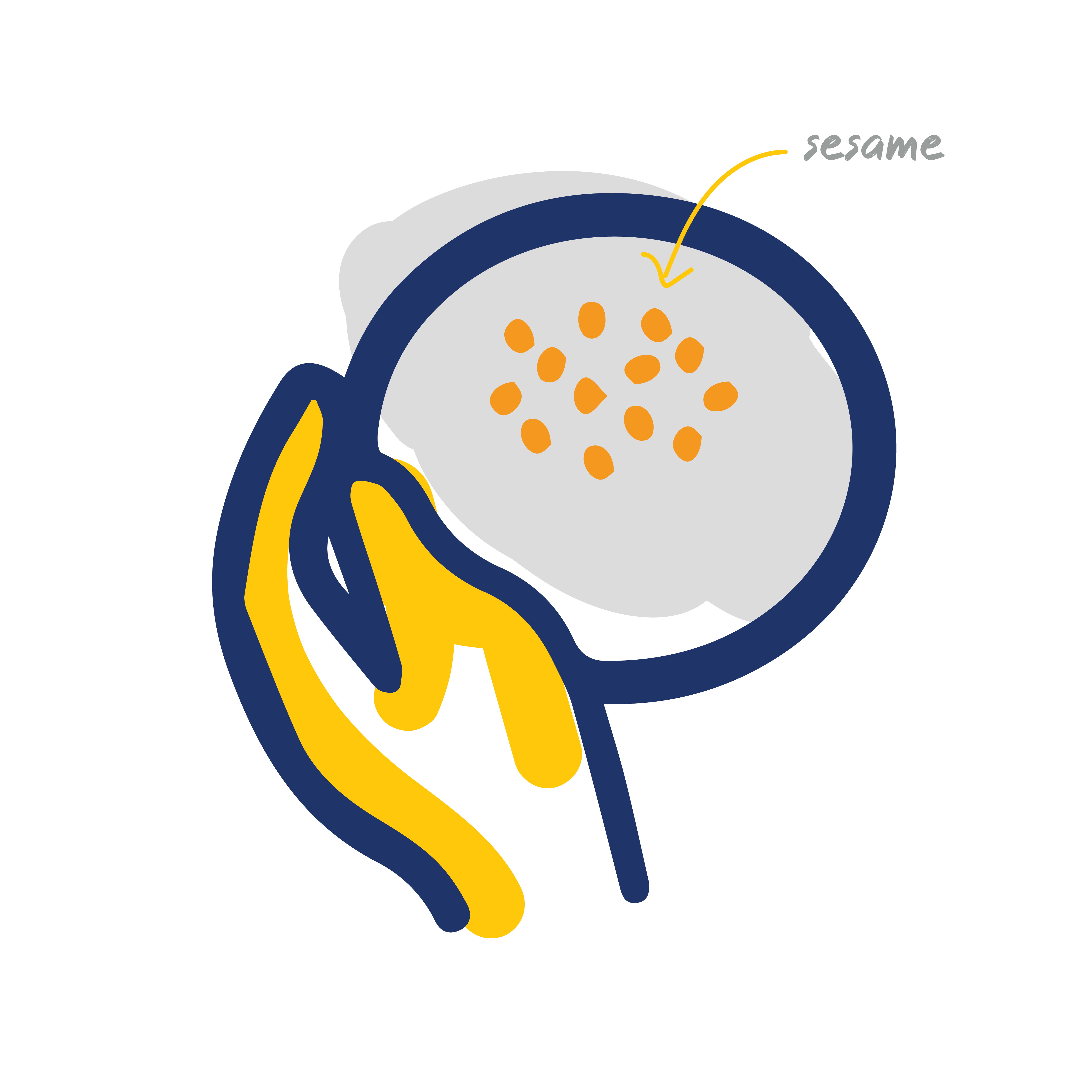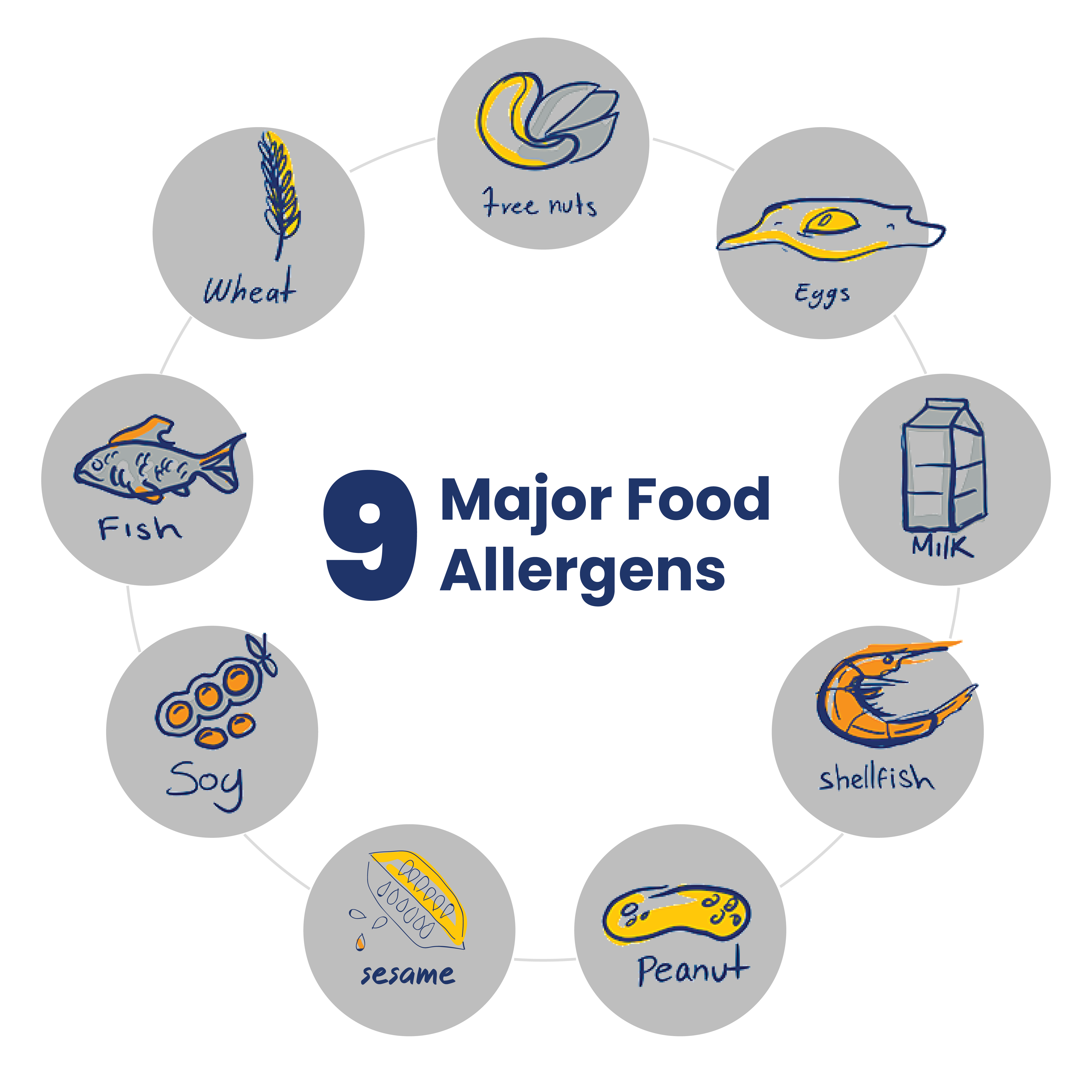Sesame, the new allergen cataloged by the FDA.
Nov 14, 2024

Sesame, a popular ingredient in many cuisines around the world, has been recently recognized as a major food allergen by the U.S. Food and Drug Administration (FDA). For people who are allergic to sesame, even small amounts of this seed can trigger a severe reaction, such as hives, itching, and difficulty breathing. With the FDA's new cataloging of sesame as a major allergen, it's important for food manufacturers, restaurants, and consumers to be aware of the risks and take necessary precautions to prevent allergic reactions. In this blog post, we'll take a closer look at the dangers of sesame allergies, the FDA's new guidelines, and how to stay safe when consuming or handling sesame-containing products.
What is Sesame?
Sesame is a fast-growing plant that can reach a height of up to 2 meters. Its white flowers produce fruit that, when ripe, opens up to reveal a small, flat-shaped seed. Depending on the variety, sesame seeds can be white, reddish, or black. Sesame is an oilseed that is commonly used as a food ingredient and for medicinal purposes.
Sesame seeds are a nutrient-dense food that contains a range of beneficial compounds, including:
- Healthy fats like oleic and linoleic acid, which are essential for cell function.
- Lecithin, a lipid that supports the nervous system.
- Proteins that promote muscle development.
- A rich source of B vitamins that support the nervous system, skin, muscles, and tissues.
- Minerals such as calcium, magnesium, phosphorus, potassium, iron, and zinc, which are important for bone health and other bodily functions.
- Antioxidants that support cellular health and help to fight infectious diseases caused by fungi and bacteria.
- Fiber, which promotes the growth of healthy gut bacteria that helps to maintain stable blood glucose levels.
Sesame seeds are a versatile ingredient commonly used in the confectionery and bakery industries. They can also be found in a wide range of foods, including granolas, energy bars, salads, sushi, pasta, meats, and soups. Sesame seeds are especially important in the production of hummus, a popular food product that has high demand among consumers. Due to their versatility and unique flavor profile, sesame seeds are widely used in many cuisines and food products around the world.
The growing popularity of healthy and vegetarian lifestyles has led to an increase in sesame consumption. However, this trend has also resulted in a significant rise in the number of sesame allergies and cases of anaphylactic shock (a life-threatening reaction that requires immediate medical attention). As more people incorporate sesame into their diets, it's important to raise awareness about the potential health risks associated with this ingredient, particularly for those who are allergic. By taking steps to educate the public and implement safety guidelines, we can help prevent allergic reactions and ensure that sesame-containing products are enjoyed safely by all.

But, what is an allergy?
An allergy is an overreaction of the immune system to a normally harmless substance, such as a food or drug. When someone with an allergy is exposed to the allergen, their immune system identifies it as a threat and releases chemicals that cause various signs and symptoms. The main signs and symptoms of an allergic reaction can include:
- Urticaria
- Red or rash skin
- Tingling sensation
- Inflammation of the vocal cords
- Itching in the mouth
- Shortness of breath
- Swelling of the face
- Loss of consciousness
- Coughing or wheezing
- Dizziness
- Diarrhoea
The Sesame Allergy. What to do?
Given the rising prevalence of sesame allergies, it has been added to the list of the most common food allergens. In countries such as the United States, the European Union, Canada, and Australia, food manufacturers are required to clearly label sesame as an ingredient in prepackaged foods. This labeling requirement helps people with sesame allergies to identify and avoid potentially harmful products. By improving awareness of the risks associated with sesame, we can help prevent allergic reactions and ensure that individuals with sesame allergies can make informed decisions about their food choices.
On April 23, 2021, the "Food Allergy Safety, Treatment, Education, and Research Act of 2021" was signed into law, commonly referred to as the FASTER Act of 2021. This legislation requires that products containing sesame be labeled and introduced into interstate commerce as of January 1, 2023. This Act updates the "Food Allergen Labeling and Consumer Protection Act (FALCPA)" of 2004, which requires that labels declare the presence of major food allergens, including milk, egg, fish, crustacean shellfish, tree nuts, peanuts, wheat, and soybeans. With the addition of sesame to this list, people with sesame allergies will be better equipped to make informed decisions about the foods they consume. Now in 2023, the FDA is encouraging food producers to implement sesame labeling as soon as possible. The exceptions to this rule are when sesame is part of a flavoring or natural spice.

It's important to note that the labeling requirements set forth in FALCPA do not apply to the unintended presence of major food allergens due to cross-contamination during the receipt, handling, production, packaging, and transportation of products. Cross-contamination can occur when food comes into contact with allergens accidentally at any stage of the production process. Despite strict manufacturing practices, it's not always possible to prevent cross-contamination from occurring. However, food producers are encouraged to implement best practices to minimize the risk of cross-contamination and to provide information on their labels about the risk of possible allergen exposure. For people with severe allergies, it's important to read food labels carefully and to seek medical advice when in doubt about whether a product is safe to consume.
Conclusion
Ensuring the safety of the food supply is a shared responsibility between food producers and consumers. Food producers have a crucial role to play in managing and controlling the presence of allergens in their products, and in preventing cross-contamination during the production process. Developing and implementing effective food safety plans is essential to minimize the risk of allergic reactions in the population that consumes these products.
At GoHACCP, we are a group of food-handling experts dedicated to helping food producers develop and implement robust food safety plans that take into account the risks associated with allergens. By partnering with us, food producers can ensure that their products are safe for all consumers to enjoy. Contact us today to learn more about how we can help you achieve your food safety goals.
Rebeca Macazaga Álvarez, Master in Biological Sciences.
“I collaborate with the Restaurants team in the development of operating procedures for companies that want to implement HACCP systems. I have experience in the food safety area since 2008, in hazard analysis, training, implementation, and second-party audits.”
Join our Food
Safety Community!
Stay ahead of the curve by exploring emerging
trends and technologies in food safety.

